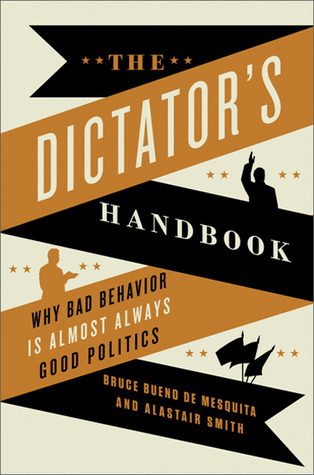What do you think?
Rate this book


321 pages, Hardcover
First published September 27, 2011




"what, for a leader, is the “best” way to govern? The answer to how best to govern: however is necessary first to come to power, then to stay in power, and to control as much national (or corporate) revenue as possible all along the way."
"Because the acceptable uses of taxation in a regime that depends on a large coalition are few—just those expenditures thought to buy more welfare than people can buy on their own—taxes tend to be low when coalitions are large. But when the coalition of essential backers is small and private goods are an efficient way to stay in power, then the well-being of the broader population falls by the waysides... In this setting leaders want to tax heavily, redistributing wealth by taking as much as they can from the poor interchangeables and the disenfranchised, giving that wealth in turn to the members of the winning coalition, making them fat, rich, and loyal."
Cases from the Middle East, China, America, Mexico, Ghana, Kenya, Russia, Britain, and many others (even private companies like HP!) serve to elucidate and clarify these seemingly abstract notions. I found the analysis regarding my country, Egypt, to be particularly illuminating.
The most critical factor behind Mubarak’s defeat in February 2011 was the decision by Egypt’s top generals to allow demonstrators to take to the streets without fear of military suppression. And why was that the case? As explained in a talk given on May 5, 2010, based on the logic set out here, cuts in US foreign aid to Egypt combined with serious economic constraints that produced high unemployment, meant that Mubarak’s coalition was likely to be underpaid and the people were likely to believe the risks and costs of rebellion were smaller than normal.
Chapter Seven on foreign aid was another gem, unexpectedly thought-provoking and informative. It explains several previously confusing and seemingly senseless attitudes, such as the US giving Pakistan (whose citizens are not huge fans of America) billions of dollars in aid to fight Al Qaeda and Taliban, with Pakistan spectacularly failing all the same. Later on, after dramatic increases in aid:
the Pakistani government accepted the aid money and greatly stepped up its pursuit of militants operating within its borders. By February 2010 they had captured the number two Taliban leader, but, as we should expect, they have also been careful not to wipe out the Taliban threat. Doing so would just lead to a termination of US funds.
Curiously, contrary to what many democracies declare, it is not in their interests for other countries to democratize, since a dictator with a small coalition is easier to buy off compared to a democratic leader beholden to the people. Trading aid for policy changes is an easy way to appease the voters but it allows tyranny to continue and the suffering of the poor and oppressed to never end.
"Our individual concerns about protecting ourselves from unfriendly democracies elsewhere typically trump our longer term belief in the benefits of democracy. Democratic leaders listen to their voters because that is how they and their political party get to keep their jobs...When a foreign people are aligned against our best interest, our best chance of getting what we want is to keep them under the yoke of an oppressor who is willing to do what we, the people, want."
I know this review is partially all over the place; however, there is absolutely no way I'd be able to summarize each eye-opening idea mentioned in this book. It seems depressing and it is so indeed, but there is light at the end of the road. The final chpater offers hints and suggestions that, if implemented, would greatly improve the livelihoods of the wretched and downtrodden. These include targeting states that depend on tourism for democratization, as they are more likely to allow their people more freedoms; exploiting the opportunities that arise when the leader is new, sick, or bankrupt, as the coalition members are uncertain whether they will be retained or disposed of; the widespread use of cell phone technology and access to the internet to allow people to communicate and organize themselves; tying foreign aid with actual improvements in governance, and not merely accepting empty promises; and offering a way out for despots "to preserve and improve the lives of the many who suffer at the hands of desperate leaders, who might be prepared to step aside in exchange for immunity."
These and more will be found in this great work of non-fiction, which will serve as a reference and a fresh perspective with which to view the realm of politics. In its essence, it is a long argument for democracy without allusion to its moralistic and egalitarian justifications. Regardless of ideology, democracy is the only course we can take to ensure prosperity and freedom for all people.
The great thing about these rules is that once understood, those of us who wish to see the world a better place can also play the game, and perhaps -hopefully- end up winning it too.
"Blind fools don’t often get to rule countries or companies."
"Autocratic politics is a battle for private rewards. Democratic politics is a battle for good policy ideas."
"[E]ven if politics is nothing more than a game that leaders play, if only we learn the rules, it becomes a game we can win."